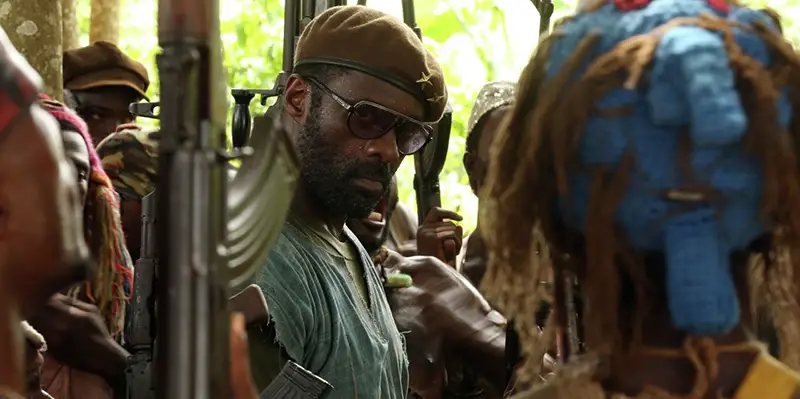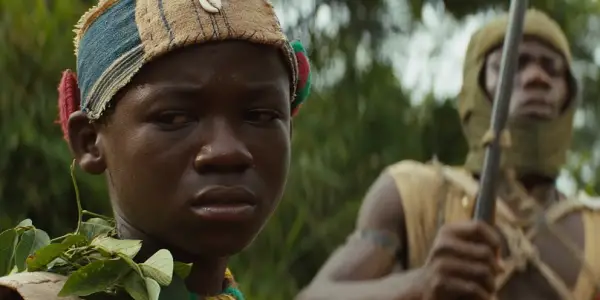BEASTS OF NO NATION: A Dramatic Yet Aimless Narrative

A bi-product of passion and experimentation gone wrong, Mike has…
Beasts of No Nation made headlines before even a trailer dropped early in 2015. The Cary Fukunaga drama about child-soldiers in Africa was bought for $12 million by the streaming powerhouse Netflix. This meant that it would be the first time in history a potential Oscar-nominated film would be available online to Netflix subscribers the same day it would be released in theaters. And since Academy rules stipulate that a movie has to play in theaters to be considered eligible within the given calendar year, Netflix premiered the movie early at the Telluride and Toronto Film Festivals to cover their bases and to start their awards push.
Now that the time has come, Beasts of No Nation is currently on Netflix and is playing in select arthouse theaters. The face of cinema is dramatically changing, and we may see format distribution drastically reform how movies are viewed; especially the oh-so “artistic” ones. But the question at hand is, as with all films, is Beasts of No Nation actually any good?
Demilitarized Zones
Agu (Abraham Attah) is an 11-year-old boy in an unnamed West African country (hence the meaning of the title), who becomes a child-solider fighting an oppressive government. Agu’s militant leader, Commandant (Idris Elba), stirs his young flock with promises of revenge and that his army is a family out to right the wrongs. The film is at times hard to watch because of the subject-matter, as anyone could expect. The first scene when Agu partakes in guerrilla warfare is down-right depressing and sad.
Other times though, Beasts of No Nation is literally difficult to watch because writer/director Cary Fukunaga believes that cinéma vérité is the only way to create immersive experiences in a film. The problem with cinéma vérité is that, if it isn’t handled with extreme care and the right kind of composition, it becomes nauseating and disengaging. And this, more than anything, is what keeps Beasts of No Nation hampered in as an average movie as opposed to becoming a great one.

Fukunaga became a household name last year when he directed the entire first season of True Detective. Having made several features before, Fukunaga’s singular vision held the season together so well that he inspired David Fincher to join HBO with a couple of TV series, and most excitedly convinced David Lynch to bring a new season of Twin Peaks to Showtime. His work on True Detective showcased Fukunaga’s talents behind the camera, and he was able to tell a story worth remembering. Sadly, the same cannot be said of Beasts.
At first, the film is a breath of fresh air, with Abraham nailing every bit of screen time like a seasoned professional who is a master of adroitness. Aided by a delicate balance of cinematic economy, the story initially seems to be self-aware about the world it’s in. But then crap hits the fan for Agu, and with it goes the imaginative style that make the first fifteen minutes or so memorable.
Idris Elba does a barely acceptable job as the militant leader of the bastard children made orphans from civil bloodshed. The majority of the time, Commandant waxes on in elongated, Shakespearian-type monologues about the strife they endure and the battles which they wage. Commandant is a facilitator, to be sure, but he’s about as interesting as the words he speaks, and they’re not very clever or inspired. He’s supposed to resemble a monomaniac like Napoleon or Captain Ahab from Moby Dick, but he’s instead a slightly larger henchman doing the bidding of others.
A Sad Ending
Agu’s journey from a wide-eyed boy into a man is the only saving grace of Beasts of No Nation. Without his experiences in a terrible circumstance, Beasts of No Nation would be a complete waste. There are little flourishes of a profound narrative in there somewhere, and the tiny embers that fade in and out spark of genius.

Take, for instance, the opening of the film. It starts with a pan outside a TV and pulls back to show it’s been hollowed out by Agu and his friends. They go around their village pretending to be performers and trying to make a few bucks on the side. Or say at the end of film when Agu goes into the ocean, there are immediate comparisons to Herman Melville’s novel Moby Dick (yet again). The allure of the deep and endless unknown is a draw for men who are weary and lost without purpose in their lives, as Agu is. It’s really a shame that the film doesn’t earn these high concepts, but merely presents them as wobbly evidence that Beats of No Nation is about something large and universal, when really it’s just faux-highbrow.
Summation
Beasts of No Nation wants desperately to be progressive and challenge the cinematic landscape, but it suffers from Cary Fukunaga’s stylistic and creative implosion. Though its new star shines vividly in a dark and dour world, his illumination isn’t enough to fully ignite an enlightening or poignant story.
Does a child in war make a story more dramatic, or is it a disservice as it may appear as purposeful manipulation?
Beasts of Nation is playing indefinitely on Netflix in the U.K., Canada, and the United States.
(top image source: Bleecker Street)
Does content like this matter to you?
Become a Member and support film journalism. Unlock access to all of Film Inquiry`s great articles. Join a community of like-minded readers who are passionate about cinema - get access to our private members Network, give back to independent filmmakers, and more.
A bi-product of passion and experimentation gone wrong, Mike has spent most of his time in the field couch surfing and growing a comb-over. Several of his favorite films are Rashomon, Vertigo, Apocalypse Now, and The Naked Gun.













